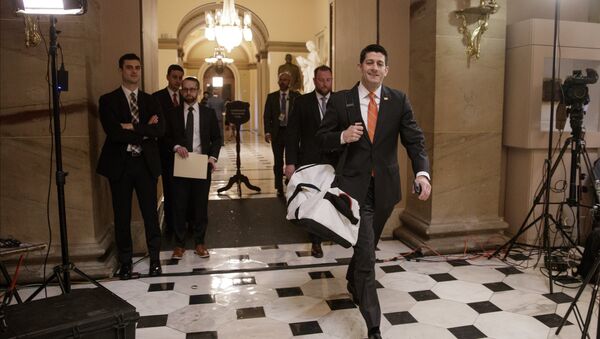Talk about a double standard. A new amendment to 2017’s American Health Care Act (AHCA), a bill so widely despised lead architect of the plan Speaker Paul Ryan declined to even bring it to the House floor for a vote, allows states to nullify the regulation to ban insurers from discriminating against individuals with a pre-existing condition or disease.
This was one of the most popular components of former President Barack Obama’s signature healthcare reform law, and that remains true today during the Trump era. A poll released Tuesday found 70 percent of Americans to be in favor of maintaining the regulation that prohibits insurers from charging higher prices to sicker individuals. Indeed, before Obamacare, insurers had free reign to outright reject someone from getting a health insurance policy if it was deemed that a pre-existing condition made a person too risky (read: expensive) to insure.
The same Washington Post-ABC poll discovered that just 26 percent of Americans are in favor of scrapping this rule.
But here’s the thing: Republicans want congressional office holders and their staff members to remain protected against insurer price discrimination. In their view, it seems the popular Obama-era policy is good enough to keep for public servants, but it shouldn’t be extended to the greater public.
This is nothing new. For years, the American insurance industry has protested the regulation by saying it unjustly interferes with market mechanisms that allow insurers to know the risk profile of the policy holders they insure. You’d think that would hurt profits, but among the top five insurers – UnitedHealth Group, Aetna, Anthem, Cigna and Humana – you would’ve made at least 60 to 70 percent return if you had purchased their stocks in 2009, before the ACA was passed. Cigna, for instance, was trading at $36.94 per share on March 23, 2010, the day Obamacare was signed into law. Yesterday, April 25, 2017 Cigna’s share closed at $157.18 — a 325 percent change.
That’s because the ACA markets represent a very small book of business for many of the biggest insurers, essentially insulating companies from heavy losses on ACA markets. The employer-sponsored insurance market, the Medicare Advantage space and managed medicaid plans are far bigger, more lucrative business segments for health insurers. About 9 to 11 million folks get health insurance plans from the Obamacare marketplace. There are more than 330 million people living in America. You don’t have to be a mathematician to see that these markets are in fact a mere fraction of the bigger picture here.
Republican Rep. Tom MacArthur of New Jersey confirmed to Vox that Capitol Hill staffers and lawmakers would be immune to insurer price discrimination under the proposed amendment. House Freedom Caucus leader Rep. Mark Meadows of North Carolina said that the waiver clause allowing states to scrap the pre-existing ban rule wouldn’t apply to lawmakers because it applies to states, and states only, and the District of Columbia is not a state.
“As proof of the bill’s devastating impact, Republican members of Congress are exempting themselves from the punishment they are willing to inflict on their constituents,” Democratic Congressional Campaign Committee spokesman Tyler Law said on Wednesday.



